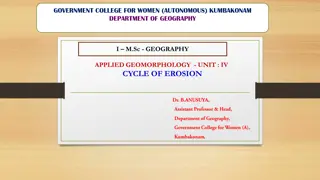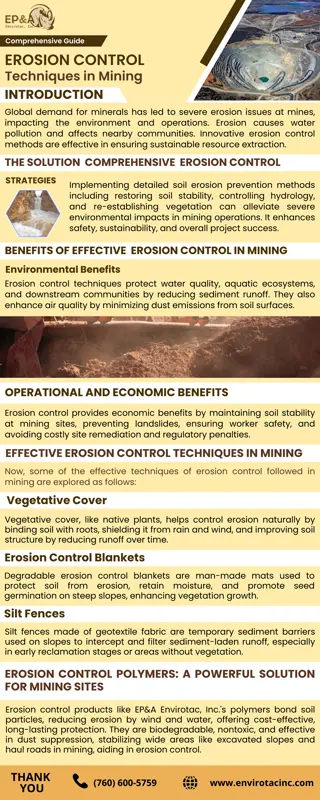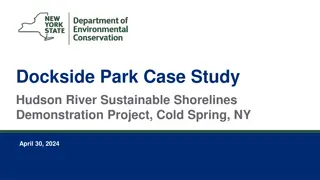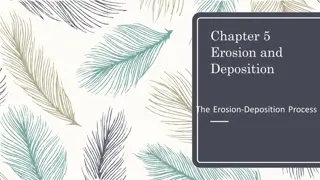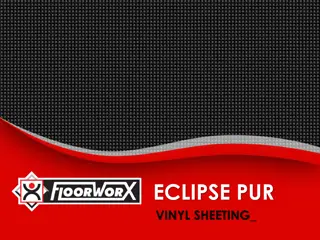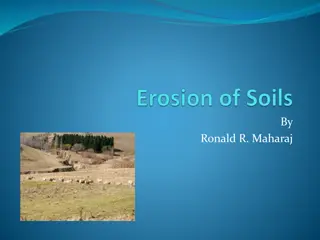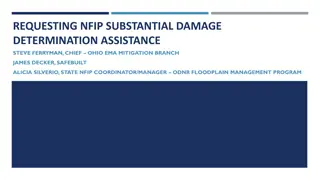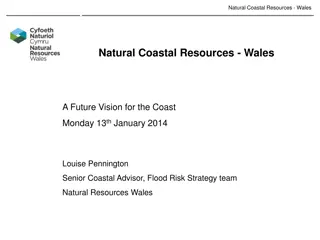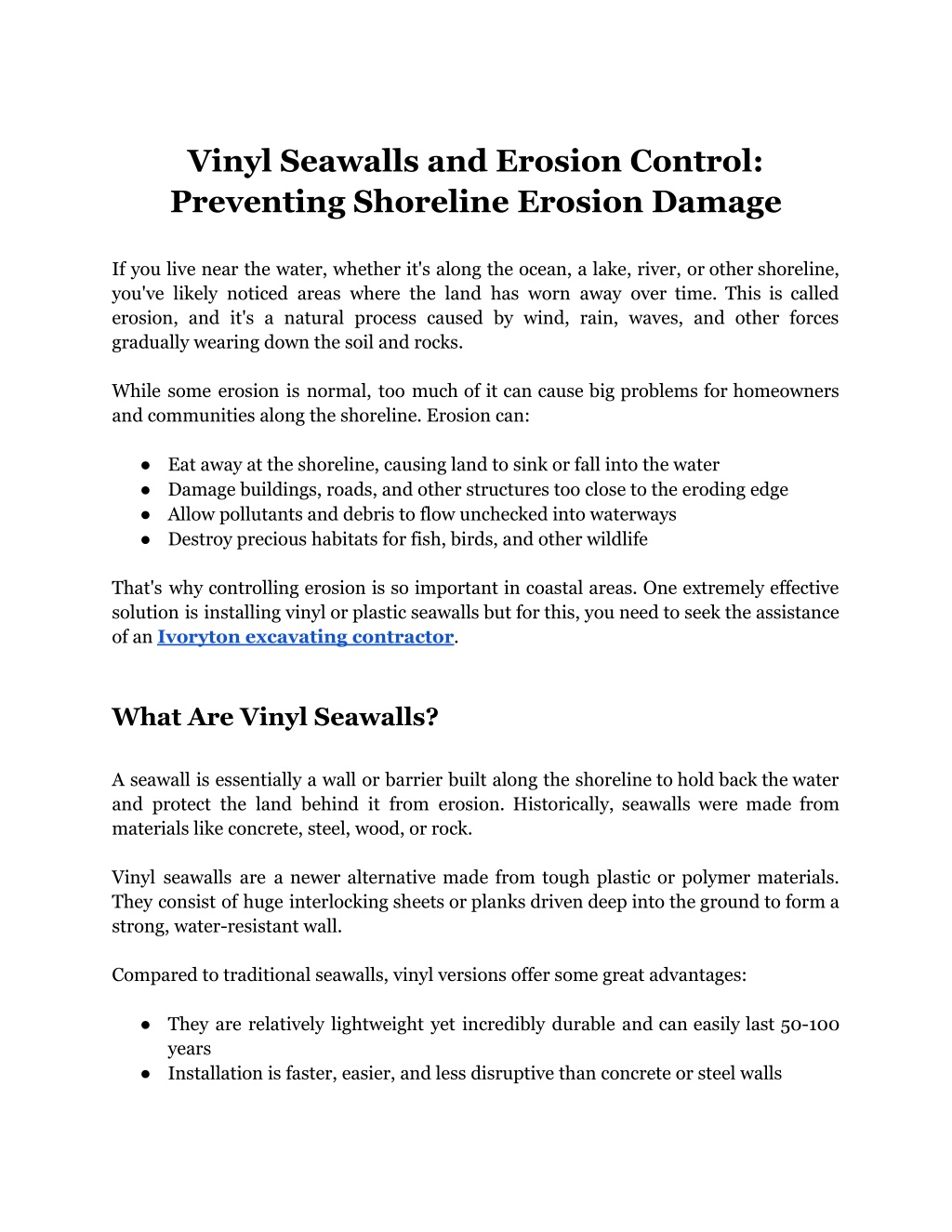
Vinyl Seawalls and Erosion Control_ Preventing Shoreline Erosion Damage
That's why controlling erosion is so important in coastal areas. One extremely effectivensolution is installing vinyl or plastic seawalls but for this, you need to seek the assistancenof an Ivoryton excavating contractor.
Download Presentation

Please find below an Image/Link to download the presentation.
The content on the website is provided AS IS for your information and personal use only. It may not be sold, licensed, or shared on other websites without obtaining consent from the author. Download presentation by click this link. If you encounter any issues during the download, it is possible that the publisher has removed the file from their server.
E N D
Presentation Transcript
Vinyl Seawalls and Erosion Control: Preventing Shoreline Erosion Damage If you live near the water, whether it's along the ocean, a lake, river, or other shoreline, you've likely noticed areas where the land has worn away over time. This is called erosion, and it's a natural process caused by wind, rain, waves, and other forces gradually wearing down the soil and rocks. While some erosion is normal, too much of it can cause big problems for homeowners and communities along the shoreline. Erosion can: Eat away at the shoreline, causing land to sink or fall into the water Damage buildings, roads, and other structures too close to the eroding edge Allow pollutants and debris to flow unchecked into waterways Destroy precious habitats for fish, birds, and other wildlife That's why controlling erosion is so important in coastal areas. One extremely effective solution is installing vinyl or plastic seawalls but for this, you need to seek the assistance of an Ivoryton excavating contractor. What Are Vinyl Seawalls? A seawall is essentially a wall or barrier built along the shoreline to hold back the water and protect the land behind it from erosion. Historically, seawalls were made from materials like concrete, steel, wood, or rock. Vinyl seawalls are a newer alternative made from tough plastic or polymer materials. They consist of huge interlocking sheets or planks driven deep into the ground to form a strong, water-resistant wall. Compared to traditional seawalls, vinyl versions offer some great advantages: They are relatively lightweight yet incredibly durable and can easily last 50-100 years Installation is faster, easier, and less disruptive than concrete or steel walls
The smooth plastic makes it easier for water to flow along, reducing scouring around the base Vinyl naturally merges into the landscape better than man-made materials They are a more environmentally friendly and sustainable option Best of all, vinyl seawalls are extremely effective at preventing erosion and protecting coastal properties. How Vinyl Seawalls Prevent Erosion? Vinyl seawalls work to stop or slow down erosion in several key ways: Blocking Waves & Currents The solid vinyl barrier blocks incoming waves and water currents from reaching the shoreline and wearing away the soil. It absorbs the force of the water and redirects it along the face of the wall. Anchoring the Shoreline vinyl seawalls help anchor the soil and sediment in place so it can't be washed or worn away by water movement with the bottom portion deeply embedded into the ground. This stabilizes the shoreline. Controlling Water Levels In some situations, vinyl walls can be used to help control water levels and prevent flooding of low-lying shoreline areas, reducing erosion risk. Enabling Revegetation vegetation can be replanted on the land side to help hold the soil together with its roots and further slow down erosion. However it can be done with the shoreline stabilized by the seawall, When combined with proper sloping, drainage, and revegetation practices, vinyl seawalls create an incredibly robust and long-lasting barrier against all types of erosion.
They are considered one of the most effective methods for permanently halting and preventing shoreline erosion. Besides protecting the shoreline itself, seawalls also safeguard Other infrastructure located behind them from being undermined or damaged by advancing erosion, such as: Buildings Roads Utilities Advantages Of Using Vinyl While vinyl seawalls provide excellent erosion control, they also offer some other advantages over traditional concrete, wood, or rock walls: Faster Installation Since vinyl sheets are relatively lightweight, they can be transported and installed much more easily than heavy materials like poured concrete. An experienced crew can install vinyl seawalls quickly with less equipment. Lower Costs The lower material weights combined with faster installation help make vinyl a more affordable option than concrete or steel walls of the same size. As a result, you'll get similar erosion protection for less money. Flexible & Movable Vinyl sheets are highly flexible and can conform to slopes, curves, and contours in the shoreline better than rigid concrete. Additionally, the panels can also be removed and relocated if needed.
Environmental Benefits Vinyl/plastic materials are generally inert and don't leach chemicals into the water like wood can. Further, vinyl walls create little disruption of sensitive shoreline habitats during installation. Low Maintenance Vinyl seawalls require very little maintenance once installed to maintain their effectiveness long-term with no cracking, chipping, or decay issues. Aesthetic Appeal While functional first, vinyl seawalls can have a more natural and appealing look once installed compared to man-made materials. Different colors can help them blend into the landscape. Of course, every shoreline erosion situation is different, and vinyl may not be the ideal solution everywhere. But for most homeowners and property owners dealing with erosion issues, vinyl seawalls are one of the best options to consider. Getting A Vinyl Seawall Installed If you're interested in getting a vinyl seawall installed on your shoreline property, the first step is to contact an experienced professional who specializes in this type of work. An established commercial excavating contractor CT will come out and thoroughly evaluate your specific property, assessing: The degree/rate of erosion occurring The shoreline's soil makeup and slope Effects of typical water flows, wave action, flooding, etc. Any environmental restrictions or permits required Nearby structures that need to be protected The best possible locations for the seawall Based on this analysis, they can then recommend the most appropriate design for the vinyl seawall and develop a proper installation plan. This may involve:
Obtaining any necessary permits and approvals first Determining the total length of the seawall needed Excavating a trench along the shoreline for the vinyl sheets Choosing the right vinyl materials for the job's requirements Properly spacing and anchoring the vinyl sheets in place Backfilling and grading the area behind the new wall Why You Need to Hire an Experienced Contractor? A professional contractor will have the specialized equipment and experienced crew to handle driving the vinyl sheets securely into the ground and dealing with any installation challenges that arise. For anything more than a small seawall project, attempting vinyl seawall installation yourself is generally not recommended. Making mistakes can compromise the wall's integrity and effectiveness over time. Hiring a qualified and experienced erosion control contractor ensures your new vinyl seawall gets installed correctly the first time to maximize its lifespan and performance. They can also work with you to design the seawall's finished appearance, choosing vinyl colors and accessories, such as caps to create a great-looking installation that enhances your property. Cost of Vinyl Seawell While vinyl seawalls themselves are relatively low maintenance, the contractor can educate you on any simple upkeep that may be needed, like occasional cleaning. Costs for a properly installed vinyl seawall system can vary significantly depending on the: Total linear feet of seawall required Shoreline characteristics and amount of preparation work Any added drainage, grading, landscaping, etc. Accessibility and logistics of the property For a basic vinyl seawall installation with minimal prep work, you can expect to pay around $100-200 per linear foot of wall. More complex or massive walls could cost $300+ per linear foot. Most property owners find that the long-term benefits of preventing erosion damage make investing in a high-quality vinyl seawall well worth the cost.
Wrap Up Vinyl seawalls offer outstanding protection against shoreline erosion caused by waves, currents, flooding, and other forces of nature. If you live on a shoreline and are concerned about current or potential erosion issues, reach out to a local erosion control company to explore if a vinyl seawall system could be the right long-term solution for your property. Don't wait until erosion causes catastrophic damage or loss of land. Call LIBBY Property Services today for a free consultation. Our erosion control specialists and excavating contractor Ivoryton CT will evaluate your shoreline and recommend the right solutions to save your property. Preserve and protect your waterfront investment for the long run.





